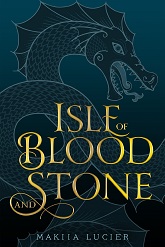Eighteen years ago, the two young princes of the island kingdom of St. John del Mar, the royal cartographer Lord Antoni, and lady-in-waiting Lady Esma, vanished without a trace when their picnic caravan was attacked. In retaliation, the king destroyed the neighboring island the murderous assailants came from. Years later, teenage Ulises is now king. Assisting him is his best friend Elias, the son of Antoni and a talented mapmaker in his own right, and his cousin Mercedes, a top-notch spy with a fiery personality. When apprentice mapmaker Reyna discovers two new maps that appear to have been drafted by Lord Antoni, Ulises enlists Elias and Mercedes to uncover the truth about the day his brothers were supposedly kidnapped and murdered. Their quest puts them face to face with fantastical monsters, angry spirits, and dark secrets better left unspoken.
Buy the Book


Isle of Blood and Stone (Tower of Winds)
Makiia Lucier’s tale is quieter than I think most people might expect, given the description on the back of the book. There’s a quest, but most of the plot takes place on two islands. Characters do battle with wicked men and vengeful ghosts, but the story isn’t action-packed. Personally, I loved it. Lucier’s light touch never felt boring or glacial. Instead, she gradually unfolds her tale in a way that keeps the reader entertained and eager for the next chapter. Isle of Blood and Stone is both light and dark simultaneously, a delicate balance that Lucier effortlessly pulls off.
And as much as I thoroughly enjoyed the plot, it’s the characters that really make the story soar. Elias, Mercedes, Ulises and Reyna are utterly delightful and compelling. Lucier is great at crafting characters with individual and complex personalities. Each one shines as a believable person with a rich interior life. They feel like they exist beyond the text on the page.
The other element I found super intriguing about this novel was the ethnic representation. I honestly can’t remember the last time I read a YA fantasy with a cast that’s predominately Pacific Islander. While Lucier doesn’t explicitly denote the characters as Pacific Islander, she describes Mercedes as having “black hair and golden skin” in contrast to the fair hair and blue/green eyes of Mondragans. The way the characters interact with the sea and the importance of voyaging to me signals the ancient Polynesians, just like the geography, climate, and ecology point to the South Pacific. Lucier diversifies the narrative by reshaping it. Her touch is so light that it’s easy to overlook it, but it’s there. Isle of Blood and Stone carries within it the spirit of the Pacific Islands, expanding a fun YA fantasy into something more unique.
In Isle of Blood and Stone, the main trio deal with some pretty heavy issues: Elias with his father’s abandonment, Ulises with the realization that his father did terrible and inexcusable things, and Mercedes with being biracial. Both Ulises and Elias must reckon with the kind men they believed their fathers to be and the reality of who they were. But because the boys had spent so much of their childhoods trying to be like their idols, suddenly learning they weren’t perfect gentlemen but real people with selfish goals and sometimes dangerous flaws is a major shift in the boys’ identity. How much do you honor the legacy of a person who caused great harm in the name of love? How do you redefine yourself when the person you wanted to be is in reality the opposite of who you are?
Mercedes has her own challenges. Being biracial is tricky enough, but when half of her ancestry is from a people who are loathed by the other half, being true to herself is damn near impossible. “And that day … it was the first time I understood that there was something wrong with being part Mondragan, and that being part del Marian mattered not at all.” Mercedes is loyal to the crown, even when her colleagues and fellow citizens spit on her and treat her like an enemy of the state. All they see when they look at her are their own stereotypes and bigoted opinions about her ethnic heritage. And, importantly, what she understands (that Ulises and Elias don’t) is that it is not her responsibility to work to undo their racism and that respectability isn’t enough to change hearts and minds.
I wish the characters dealt with the strict gender roles enforced in Mondragan society. Lucier hints at an undercurrent of discord—Elias supporting Reyna’s dream to become a cartographer’s apprentice even though girls are typically not allowed to do so, Mercedes being a kick-ass spy and bad-ass noblewoman, the one-legged woman in the woods, the ghost girls, etc.—but stops short of an actual call out. Also would’ve liked some queerness mixed in. Here’s hoping the sequel pushes the boundaries a bit more.
Isle of Blood and Stone reminded me a bit of a cross between Mackenzi Lee’s The Gentleman’s Guide to Vice and Virtue and Heidi Heilig’s Girl from Everywhere series. Given that Lee and Heilig’s novels were two of my favorite books of 2017, that’s quite the compliment. The romance is a sweeping slow burn, the plot full of adventure and risk, and there’s just enough fantasy for fans of magical beasties and not too much too overwhelm those who aren’t. I had been eagerly anticipating this read for months before I finally landed a copy, and Lucier did not disappoint. Already, this is becoming one of those novels I recommend to just about everyone. The conclusion of the duology cannot come soon enough.
Isle of Blood and Stone is available from Houghton Mifflin Harcout.
Alex Brown is a YA librarian by day, local historian by night, pop culture critic/reviewer by passion, and QWoC all the time. Keep up with her every move on Twitter, check out her endless barrage of cute rat pics on Instagram, or follow along with her reading adventures on her blog.










